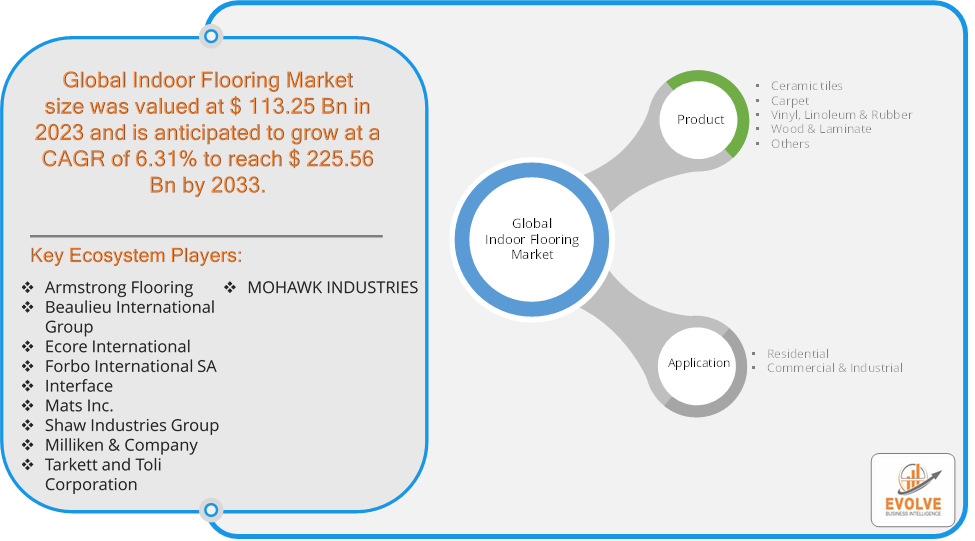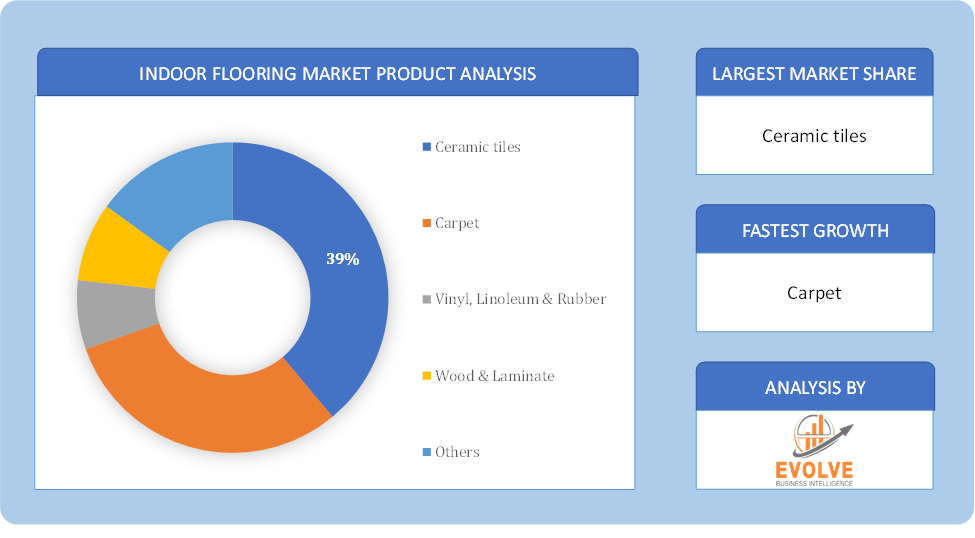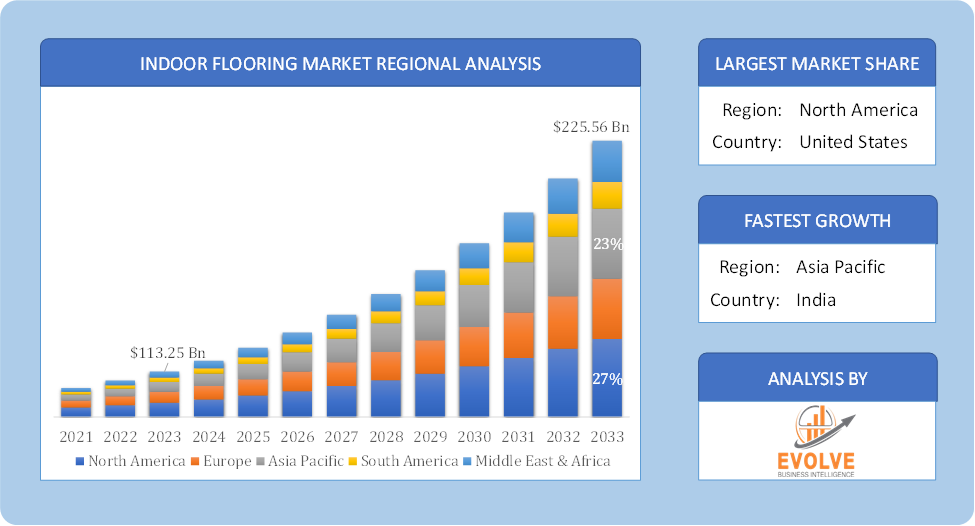Indoor Flooring Market Analysis and Global Forecast 2023-2033
$ 1,390.00 – $ 5,520.00Price range: $ 1,390.00 through $ 5,520.00
Indoor Flooring Market Research Report: Information By Product Type (Frozen Ready Meals, Frozen Seafood, Frozen Meat And Poultry, Frozen Fruit And Vegetables, Frozen Potatoes, Frozen Soups), By Application (Food Service Industry, Retail Users), and by Region — Forecast till 2033
Page: 145
Indoor Flooring Market Overview
The Indoor Flooring Market Size is expected to reach USD 225.56 Billion by 2033. The Indoor Flooring industry size accounted for USD 113.25 Billion in 2023 and is expected to expand at a compound annual growth rate (CAGR) of 6.31% from 2023 to 2033. The indoor flooring market encompasses various materials and products used for covering floors inside residential, commercial, and industrial spaces. Key segments include hardwood, laminate, vinyl, tile, carpet, and natural stone. Factors driving market growth include aesthetic preferences, durability, ease of maintenance, and technological advancements in flooring materials. Trends like sustainability and eco-friendly products are gaining prominence. The market is influenced by real estate development, renovation activities, and changing consumer lifestyles. Major players in the market often focus on innovation and expanding product lines to cater to diverse customer needs.
Global Indoor Flooring Market Synopsis
 Indoor Flooring Market Dynamics
Indoor Flooring Market Dynamics
The major factors that have impacted the growth of Indoor Flooring are as follows:
Drivers:
Ø Technological Advancements
Innovations in flooring technology, such as enhanced durability, ease of installation, and improved aesthetics, contribute to market growth. Advanced features like water resistance, anti-microbial properties, and eco-friendly materials appeal to a wide range of consumers.
Restraint:
- Maintenance and Durability Issues
While many flooring options are marketed as low-maintenance, some materials still require regular upkeep to maintain their appearance and performance. Additionally, issues with durability, such as scratching or denting, can be a concern, particularly for high-traffic areas.
Opportunity:
⮚ Technological Advancements
Innovations in flooring technology, such as advanced materials with enhanced durability, water resistance, and ease of maintenance, offer substantial opportunities. The integration of smart technologies, like sensor-embedded flooring that can monitor health metrics or environmental conditions, can also open new market segments and attract tech-savvy consumers.
Indoor Flooring Segment Overview
Based on Product Type, the market is segmented based on Ceramic tiles, Carpet, Vinyl, Linoleum & Rubber, Wood & Laminate, Others. In the indoor flooring market, ceramic tiles often dominate due to their durability, versatility, and wide range of design options, making them a popular choice for both residential and commercial applications.
By Application
Based on Applications, the market has been divided into the Residential, Commercial & Industrial. the residential segment typically dominates, driven by high consumer demand for aesthetic and functional flooring solutions in homes. The commercial and industrial segments also contribute significantly, particularly in sectors with extensive renovation and construction activities.
Global Indoor Flooring Market Regional Analysis
Based on region, the global Indoor Flooring market has been divided into North America, Europe, Asia-Pacific, the Middle East & Africa, and Latin America. North America is projected to dominate the use of the Indoor Flooring market followed by the Asia-Pacific and Europe regions.
 Indoor Flooring Asia Pacific Market
Indoor Flooring Asia Pacific Market
Asia Pacific holds a dominant position in the Indoor Flooring Market. Asia Pacific is still the largest and fastest-growing region in the market, with annual revenue of USD 180.55 billion in 2020. This is explained by the rise in organized policies and planned investments for building projects in Southeast Asia, China, and India. Furthermore, the local market will be further driven by the fast industrialization. As the market leader, China is anticipated to experience faster growth.
Indoor Flooring North America Market
The North America region has indeed emerged as the fastest-growing market for the Indoor Flooring industry. The growing need for upscale residences, office space, and healthcare facilities in North America will fuel market expansion. The market is anticipated to expand significantly in South America as a result of a rise in the number of private and multi-story home renovation and remodeling projects.
Competitive Landscape
The global Indoor Flooring market is highly competitive, with numerous players offering a wide range of software solutions. The competitive landscape is characterized by the presence of established companies, as well as emerging startups and niche players. To increase their market position and attract a wide consumer base, the businesses are employing various strategies, such as product launches, and strategic alliances.
Prominent Players:
- Armstrong Flooring
- Beaulieu International Group
- Ecore International
- Forbo International SA
- Interface
- Mats Inc.
- Shaw Industries Group
- Milliken & Company
- Tarkett and Toli Corporation
- MOHAWK INDUSTRIES
Key Development
In September 2022, Milliken & Company expanded its portfolio in the indoor flooring market by launching innovative flooring solutions with enhanced sustainability and performance features, emphasizing their commitment to eco-friendly and high-quality products.
Scope of the Report
Global Indoor Flooring Market, by Product
- Ceramic tiles
- Carpet
- Vinyl, Linoleum & Rubber
- Wood & Laminate
- Others
Global Indoor Flooring Market, by Application
- Residential
- Commercial & Industrial
Global Indoor Flooring Market, by Region
- North America
- US
- Canada
- Mexico
- Europe
- UK
- Germany
- France
- Italy
- Spain
- Benelux
- Nordic
- Rest of Europe
- Asia Pacific
- China
- Japan
- South Korea
- Indonesia
- Austalia
- Malaysia
- India
- Rest of Asia Pacific
- South America
- Brazil
- Argentina
- Rest of South America
- Middle East & Africa
- Saudi Arabia
- UAE
- Egypt
- South Africa
- Rest of Middle East & Africa
| Parameters | Indicators |
|---|---|
| Market Size | 2033: USD 225.56 Billion |
| CAGR (2023-2033) | 6.31% |
| Base year | 2022 |
| Forecast Period | 2023-2033 |
| Historical Data | 2021 (2017 to 2020 On Demand) |
| Report Coverage | Revenue Forecast, Competitive Landscape, Growth Factors, and Trends |
| Key Segmentations | Product Type, Application |
| Geographies Covered | North America, Europe, Asia-Pacific, South America, Middle East, Africa |
| Key Vendors | Armstrong Flooring, Beaulieu International Group, Ecore International, Forbo International SA, Interface, Mats Inc., Shaw Industries Group, Milliken & Company, Tarkett and Toli Corporation, MOHAWK INDUSTRIES. |
| Key Market Opportunities | · Rapid growth in industrialization and urbanization |
| Key Market Drivers | · Rapid growth in the construction industry across the globe The rise in home improvement and renovation projects |
REPORT CONTENT BRIEF:
- High-level analysis of the current and future Indoor Flooring market trends and opportunities
- Detailed analysis of current market drivers, restraining factors, and opportunities in the future
- Indoor Flooring market historical market size for the year 2021, and forecast from 2023 to 2033
- Indoor Flooring market share analysis at each product level
- Competitor analysis with detailed insight into its product segment, Government & Defense strength, and strategies adopted.
- Identifies key strategies adopted including product launches and developments, mergers and acquisitions, joint ventures, collaborations, and partnerships as well as funding taken and investment done, among others.
- To identify and understand the various factors involved in the global Indoor Flooring market affected by the pandemic
- To provide a detailed insight into the major companies operating in the market. The profiling will include the Government & Defense health of the company’s past 2-3 years with segmental and regional revenue breakup, product offering, recent developments, SWOT analysis, and key strategies.
Frequently Asked Questions (FAQ)
What is the study period of this market?
The study period of the global Indoor Flooring market is 2021- 2033
What is the growth rate of the global Indoor Flooring market?
The global Indoor Flooring market is growing at a CAGR of 6.31% over the next 10 years
Which region has the highest growth rate in the market of Indoor Flooring?
North America is expected to register the highest CAGR during 2023-2033
Which region has the largest share of the global Indoor Flooring market?
Asia Pacific holds the largest share in 2022
Who are the key players in the global Indoor Flooring market?
Armstrong Flooring, Beaulieu International Group, Ecore International, Forbo International SA, Interface, Mats Inc., Shaw Industries Group, Milliken & Company, Tarkett and Toli Corporation, and MOHAWK INDUSTRIES are the major companies operating in the market.
Do you offer Post Sale Support?
Yes, we offer 16 hours of analyst support to solve the queries
Do you sell particular sections of a report?
Yes, we provide regional as well as country-level reports. Other than this we also provide a sectional report. Please get in contact with our sales representatives.
Press Release

Global Pharmaceutical Manufacturing Market to Reach $1.38 Trillion by 2035 with 7.35% CAGR, New Research Shows

The Global Mammography Market Is Estimated To Record a CAGR of Around 10.29% During The Forecast Period

Glue Stick Market to Reach USD 2.35 Billion by 2034

Podiatry Service Market to Reach USD 11.88 Billion by 2034

Microfluidics Technology Market to Reach USD 32.58 Billion by 2034

Ferric Chloride Market to Reach USD 10.65 Billion by 2034

Family Practice EMR Software Market to Reach USD 21.52 Billion by 2034

Electric Hairbrush Market to Reach USD 15.95 Billion by 2034

Daily Bamboo Products Market to Reach USD 143.52 Billion by 2034

Cross-border E-commerce Logistics Market to Reach USD 112.65 Billion by 2034
Table of Content
Chapter 1. Executive Summary Chapter 2. Scope Of The Study 2.1. Market Definition 2.2. Scope Of The Study 2.2.1. Objectives of Report 2.2.2. Limitations 2.3. Market Structure Chapter 3. Evolve BI Methodology Chapter 4. Market Insights and Trends 4.1. Supply/ Value Chain Analysis 4.1.1. Raw Applications Providers 4.1.2. Manufacturing Process 4.1.3. Distributors/Retailers 4.1.4. End-Use Industry 4.2. Porter’s Five Forces Analysis 4.2.1. Threat Of New Entrants 4.2.2. Bargaining Power Of Buyers 4.2.3. Bargaining Power Of Suppliers 4.2.4. Threat Of Substitutes 4.2.5. Industry Rivalry 4.3. Impact Of COVID-19 on the Indoor Flooring Market 4.3.1. Impact on Market Size 4.3.2. End-Use Industry Trend, Preferences, and Budget Impact 4.3.3. Regulatory Framework/Government Policies 4.3.4. Key Players' Strategy to Tackle Negative Impact 4.3.5. Opportunity Window 4.4. Technology Overview 12.28. Macro factor 4.6. Micro Factor 4.7. Demand Supply Gap Analysis of the Indoor Flooring Market 4.8. Import Analysis of the Indoor Flooring Market 4.9. Export Analysis of the Indoor Flooring Market Chapter 5. Market Dynamics 5.1. Introduction 5.2. DROC Analysis 5.2.1. Drivers 5.2.2. Restraints 5.2.3. Opportunities 5.2.4. Challenges 5.3. Patent Analysis 5.4. Industry Roadmap 5.5. Parent/Peer Market Analysis Chapter 6. Global Indoor Flooring Market, By Product Type 6.1. Introduction 6.2. Ceramic tiles 6.3. Carpet 6.4. Vinyl, Linoleum & Rubber 6.5. Wood & Laminate 6.6. Others Chapter 7. Global Indoor Flooring Market, By Application 7.1. Introduction 7.2. Residential 7.3. Commercial & Industrial Chapter 8. Global Indoor Flooring Market, By Region 8.1. Introduction 8.2. North America 8.2.1. Introduction 8.2.2. Driving Factors, Opportunity Analyzed, and Key Trends 8.2.3. Market Size and Forecast, By Country, 2023-2033 8.2.4. Market Size and Forecast, By Product Type, 2023-2033 8.2.5. Market Size and Forecast, By Application, 2023-2033 8.2.6. US 8.2.6.1. Introduction 8.2.6.2. Driving Factors, Opportunity Analyzed, and Key Trends 8.2.6.3. Market Size and Forecast, By Product Type, 2023-2033 8.2.6.4. Market Size and Forecast, By Application, 2023-2033 8.2.7. Canada 8.2.7.1. Introduction 8.2.7.2. Driving Factors, Opportunity Analyzed, and Key Trends 8.2.7.4. Market Size and Forecast, By Product Type, 2023-2033 8.2.7.5. Market Size and Forecast, By Application, 2023-2033 8.3. Europe 8.3.1. Introduction 8.3.2. Driving Factors, Opportunity Analyzed, and Key Trends 8.3.3. Market Size and Forecast, By Country, 2023-2033 8.3.4. Market Size and Forecast, By Product Type, 2023-2033 8.3.5. Market Size and Forecast, By Application, 2023-2033 8.3.6. Germany 8.3.6.1. Introduction 8.3.6.2. Driving Factors, Opportunity Analyzed, and Key Trends 8.3.6.3. Market Size and Forecast, By Product Type, 2023-2033 8.3.6.4. Market Size and Forecast, By Application, 2023-2033 8.3.7. France 8.3.7.1. Introduction 8.3.7.2. Driving Factors, Opportunity Analyzed, and Key Trends 8.3.7.3. Market Size and Forecast, By Product Type, 2023-2033 8.3.7.4. Market Size and Forecast, By Application, 2023-2033 8.3.8. UK 8.3.8.1. Introduction 8.3.8.2. Driving Factors, Opportunity Analyzed, and Key Trends 8.3.8.3. Market Size and Forecast, By Product Type, 2023-2033 8.3.8.4. Market Size and Forecast, By Application, 2023-2033 8.3.9. Italy 8.3.9.1. Introduction 8.3.9.2. Driving Factors, Opportunity Analyzed, and Key Trends 8.3.9.3. Market Size and Forecast, By Product Type, 2023-2033 8.3.9.4. Market Size and Forecast, By Application, 2023-2033 8.3.11. Rest Of Europe 8.3.11.1. Introduction 8.3.11.2. Driving Factors, Opportunity Analyzed, and Key Trends 8.3.11.3. Market Size and Forecast, By Product Type, 2023-2033 8.3.11.4. Market Size and Forecast, By Application, 2023-2033 8.4. Asia-Pacific 8.4.1. Introduction 8.4.2. Driving Factors, Opportunity Analyzed, and Key Trends 8.4.3. Market Size and Forecast, By Country, 2023-2033 8.4.4. Market Size and Forecast, By Product Type, 2023-2033 8.12.28. Market Size and Forecast, By Application, 2023-2033 8.4.6. China 8.4.6.1. Introduction 8.4.6.2. Driving Factors, Opportunity Analyzed, and Key Trends 8.4.6.3. Market Size and Forecast, By Product Type, 2023-2033 8.4.6.4. Market Size and Forecast, By Application, 2023-2033 8.4.7. India 8.4.7.1. Introduction 8.4.7.2. Driving Factors, Opportunity Analyzed, and Key Trends 8.4.7.3. Market Size and Forecast, By Product Type, 2023-2033 8.4.7.4. Market Size and Forecast, By Application, 2023-2033 8.4.8. Japan 8.4.8.1. Introduction 8.4.8.2. Driving Factors, Opportunity Analyzed, and Key Trends 8.4.8.3. Market Size and Forecast, By Product Type, 2023-2033 8.4.8.4. Market Size and Forecast, By Application, 2023-2033 8.4.9. South Korea 8.4.9.1. Introduction 8.4.9.2. Driving Factors, Opportunity Analyzed, and Key Trends 8.4.9.3. Market Size and Forecast, By Product Type, 2023-2033 8.4.9.4. Market Size and Forecast, By Application, 2023-2033 8.4.10. Rest Of Asia-Pacific 8.4.10.1. Introduction 8.4.10.2. Driving Factors, Opportunity Analyzed, and Key Trends 8.4.10.3. Market Size and Forecast, By Product Type, 2023-2033 8.4.10.4. Market Size and Forecast, By Application, 2023-2033 8.5. Rest Of The World (RoW) 8.5.1. Introduction 8.5.2. Driving Factors, Opportunity Analyzed, and Key Trends 8.5.3. Market Size and Forecast, By Product Type, 2023-2033 8.5.4. Market Size and Forecast, By Application, 2023-2033 Chapter 9. Company Landscape 9.1. Introduction 9.2. Vendor Share Analysis 9.3. Key Development Analysis 9.4. Competitor Dashboard Chapter 10. Company Profiles 10.1. Armstrong Flooring 10.1.1. Business Overview 10.1.2. Government & Defense Analysis 10.1.2.1. Government & Defense – Existing/Funding 10.1.3. Product Portfolio 10.1.4. Recent Development and Strategies Adopted 10.1.5. SWOT Analysis 10.2. Beaulieu International Group 10.2.1. Business Overview 10.2.2. Government & Defense Analysis 10.2.2.1. Government & Defense – Existing/Funding 10.2.3. Product Portfolio 10.2.4. Recent Development and Strategies Adopted 10.2.5. SWOT Analysis 10.3. Ecore International 10.3.1. Business Overview 10.3.2. Government & Defense Analysis 10.3.2.1. Government & Defense – Existing/Funding 10.3.3. Product Portfolio 10.3.4. Recent Development and Strategies Adopted 10.3.5. SWOT Analysis 10.4. Forbo International SA 10.4.1. Business Overview 10.4.2. Government & Defense Analysis 10.4.2.1. Government & Defense – Existing/Funding 10.4.3. Product Portfolio 10.4.4. Recent Development and Strategies Adopted 10.12.28. SWOT Analysis 10.5. Interface 10.5.1. Business Overview 10.5.2. Government & Defense Analysis 10.5.2.1. Government & Defense – Existing/Funding 10.5.3. Product Portfolio 10.5.4. Recent Development and Strategies Adopted 10.5.5. SWOT Analysis 10.6. Mats Inc. 10.6.1. Business Overview 10.6.2. Government & Defense Analysis 10.6.2.1. Government & Defense – Existing/Funding 10.6.3. Product Portfolio 10.6.4. Recent Development and Strategies Adopted 10.6.5. SWOT Analysis 10.7. Shaw Industries Group 10.7.1. Business Overview 10.7.2. Government & Defense Analysis 10.7.2.1. Government & Defense – Existing/Funding 10.7.3. Product Portfolio 10.7.4. Recent Development and Strategies Adopted 10.7.5. SWOT Analysis 10.8 Milliken & Company 10.8.1. Business Overview 10.8.2. Government & Defense Analysis 10.8.2.1. Government & Defense – Existing/Funding 10.8.3. Product Portfolio 10.8.4. Recent Development and Strategies Adopted 10.8.5. SWOT Analysis 10.9 Tarkett and Toli Corporation 10.9.1. Business Overview 10.9.2. Government & Defense Analysis 10.9.2.1. Government & Defense – Existing/Funding 10.9.3. Product Portfolio 10.9.4. Recent Development and Strategies Adopted 10.9.5. SWOT Analysis 10.10. MOHAWK INDUSTRIES 10.10.1. Business Overview 10.10.2. Government & Defense Analysis 10.10.2.1. Government & Defense – Existing/Funding 10.10.3. Product Portfolio 10.10.4. Recent Development and Strategies Adopted 10.10.5. SWOT Analysis
Connect to Analyst
Research Methodology









